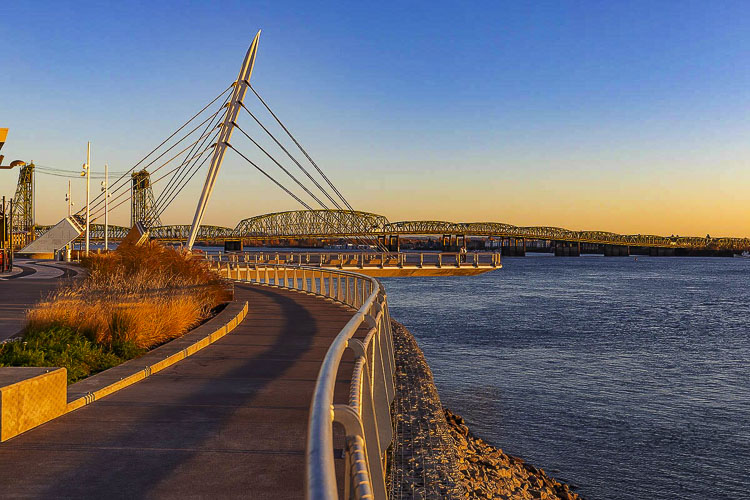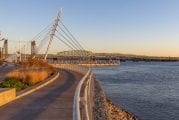The ferry would also operate on Saturdays, stopping at additional (yet-to-be-determined) stops that may include Vancouver, Duckworth Dock at the Moda Center and OMSI
Friends of Frog Ferry 501(c) held a news conference in Cathedral Park today to announce a pilot project for a passenger ferry service. The pilot project would feature one 70-passenger vessel operating 14 hours per day, Monday-Friday during heavy commuter hours between Cathedral Park and RiverPlace in downtown Portland.

The ferry would also operate on Saturdays, stopping at additional (yet-to-be-determined) stops that may include Vancouver, Duckworth Dock at the Moda Center and OMSI, among others depending on regional events happening on weekends and the interest of the local municipalities. The 24-month pilot project will launch in Summer/Fall 2022 and run through Summer 2024.
The pilot project will shuttle approximately 1,000 passengers per day (200,000 passengers per year), displacing an estimated 600 automobiles a day from the region’s roadways. The duration of the trip is 25 minutes each way. Proposed ticket costs are $3 each way and $2 for honored citizens.
The pilot project is the next step toward development of a fully operational passenger ferry service in the Portland metro area. An Operational Feasibility Study and Finance Plan, released in October 2020, showed that a passenger ferry service is a viable, cost-effective and environmentally responsible public transit option for the region.
Friends of Frog Ferry is working to secure state and federal funding, as well as private funding, for the pilot project. The total cost for the three-year pilot project is $9.4 million for planning, mobilization and operations. Year one is dedicated to planning and mobilization, and years two and three to operation.
“I’m delighted to see our vision to bring a passenger ferry to the region one step closer to reality,” said Susan Bladholm, founder and president of Friends of Frog Ferry. “By launching a pilot project, we’ll actually have passengers using a ferry system in Portland while we get to study what a fully operational ferry system could look like in the future. I’m incredibly thankful for all the time, energy, work and funding support we’ve received from volunteers, donors and various city and state agencies throughout the region. If all goes as planned, you’ll be able to hop aboard Frog Ferry in Portland next year!”
Sam Adams, director of strategic innovations for the city of Portland, voiced the city’s support for a pilot project proof of concept during the news conference. The city of Portland will sponsor Friends of Frog Ferry’s grant application for $3.3 million of federal funding for the pilot project. A public agency must sponsor applications for Federal Transit Administration (FTA) grants, which typically come at an 80-20 percent (or more) federal to state match. There are federal funds specifically designated for passenger ferry operations in the U.S. Oregon does not regularly access federal funds available for passenger ferry service. The city of Portland is supporting the application for federal funds and has not committed funding; Friends of Frog Ferry will be responsible for all funding sources and operations of the pilot project.
“A passenger ferry service will help address equitable transit for all Portlanders and better connect residents with the outdoors and our river system,” Bladholm continues. “We are all ready for a new and better Portland, one that prioritizes social and climate equity and the future for our city. Frog Ferry is part of that vision, and we are confident in our city and downtown as the pandemic eases and residents begin returning downtown.”
Funding procurement is still underway for the pilot project. Potential funding sources include farebox/sales, FTA grants, local/state governments, private businesses and corporate sponsors, foundations, community funding opportunities and private benefactors.
A passenger ferry service is viewed as one piece of the puzzle in solving the region’s traffic congestion issues and a compelling means to get commuters out of their cars as Portland grows and sees more traffic on the region’s roadways. In addition to helping improve traffic congestion, a passenger ferry is considered more environmentally friendly than commuting by car. The vessel for the passenger ferry pilot project would run on R99, a renewable diesel that is 80 percent cleaner than using traditional diesel. The plan is to ultimately run a fully electric fleet of vessels (up to seven), which would begin building in 2024, adding a vessel to the fleet every year using federal funding. During the pilot project, an estimated 3,170 metric tons of CO2 per year from commuter vehicles will be displaced.
ODOT Helps Support Frog Ferry Pilot Project
The Oregon Department of Transportation (ODOT) will also help support the project. ODOT recently awarded Friends of Frog Ferry a $500,000 Statewide Transportation Improvement Fund (STIF) grant to build out the pilot project. STIF grants are funded through Oregon’s Transit Tax, a state payroll tax equal to one-tenth of 1 percent of wages paid to employees. STIF funds are intended to expand and improve public transportation services for current and future transit users. STIF may be used for public transportation purposes that support the effective planning, deployment, operation, and administration of public transportation programs. The City of Portland sponsored Friends of Frog Ferry’s application for STIF funding. This is the second STIF grant award to Frog Ferry; $200,000 was awarded in 2019 to help fund the River Reconnaissance Report, the Operational Feasibility Study and the Finance Plan.
For more information about the pilot project, including funding, route map and vessel renderings, visit www.frogferry.com
About Friends of Frog Ferry
Friends of Frog Ferry 501(c)(3) was founded in 2017, by Susan Bladholm, who started the passenger ferry initiative to activate the Columbia and Willamette rivers as an alternate transportation option. An Operational Feasibility Study, Finance Plan, Best Practice Case Study Report and Demand Modeling Report may be found at www.frogferry.com. Frog Ferry is a grassroots effort supported by hundreds of volunteers serving on nine committees. To date, more than $7 million in pro bono goods and services have been contributed to the effort.
Also read:
Frog Ferry feasibility study finishes with optimistic outlook for future service





